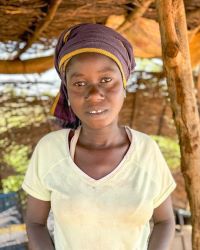Bambara in Niger

Photo Source:
manothegreek
|
Send Joshua Project a map of this people group.
|
| People Name: | Bambara |
| Country: | Niger |
| 10/40 Window: | Yes |
| Population: | 58,000 |
| World Population: | 7,781,100 |
| Primary Language: | Bamanankan |
| Primary Religion: | Islam |
| Christian Adherents: | 4.00 % |
| Evangelicals: | 1.80 % |
| Scripture: | Complete Bible |
| Ministry Resources: | Yes |
| Jesus Film: | Yes |
| Audio Recordings: | Yes |
| People Cluster: | Manding |
| Affinity Bloc: | Sub-Saharan Peoples |
| Progress Level: |
|
Introduction / History
During the 1700s, there were two Bambara kingdoms: Segu and Karta. In the 1800s, militant Muslim groups overthrew these kingdoms, leaving only a few anti-Muslim Bambara warlords to resist their occupation. This lasted 40 years, until the arrival of the French colonialists. A very small number of the Bambara had converted to Islam by 1912.
After World War II, the number of Muslim converts grew as a form of rebellion against the French and because of their exposure to Muslim merchants. Today, the Bambara are mostly Muslim.
Where Are they Located?
Most of the Bambara people live in Mali, but they are also scattered in other West African countries such as Niger, just to the east.
What Are Their Lives Like?
The Bambara people are intermingled with other African tribes, and they have no centralized organization. Instead, each small district, made up of villages, answers to a dominant family that designates a chief. This chief, aka, fama, has much power, but he must defer to a council of elders.
Bambaras have a patrilineal and patriarchal social structure, meaning that men hold most of the decision-making power. Traditionally they had a hierarchal system with castes, nobles, etc. but that has changed. Extended families live in the same village, and they work together to make sure everyone's needs are met. Bambara people marry outside their extended families. A man can have multiple wives. He always wants a wife who can work hard and bear many children.
What Are Their Beliefs?
Although most Bambara claim to be Muslim, many still follow their traditional beliefs. Though they believe in a god of creation, he is not necessarily associated with Allah, the god of Islam. Bambara traditional beliefs include ancestor worship, or praying to deceased ancestors for guidance. The Bambara believe that the ancestral spirits may take on the forms of animals or even vegetables. In special ceremonies, the spirits are worshipped and presented with offerings of flour and water. The eldest member of a lineage acts as the "mediator" between the living and the dead.
What Are Their Needs?
Several mission agencies are currently focusing on the Bambara, and they have made some progress. They need more workers in Niger.
Prayer Points
Pray for the effectiveness of the JESUS Film among the Bambara people in Niger.
Pray that the Holy Spirit will complete the work begun in the hearts of the Bambara believers through adequate discipleship.
Pray that God will give the Bambara believers boldness to share the love of Jesus with their own people.
Ask the Lord to raise strong, reproducing local churches among the Bambara people.